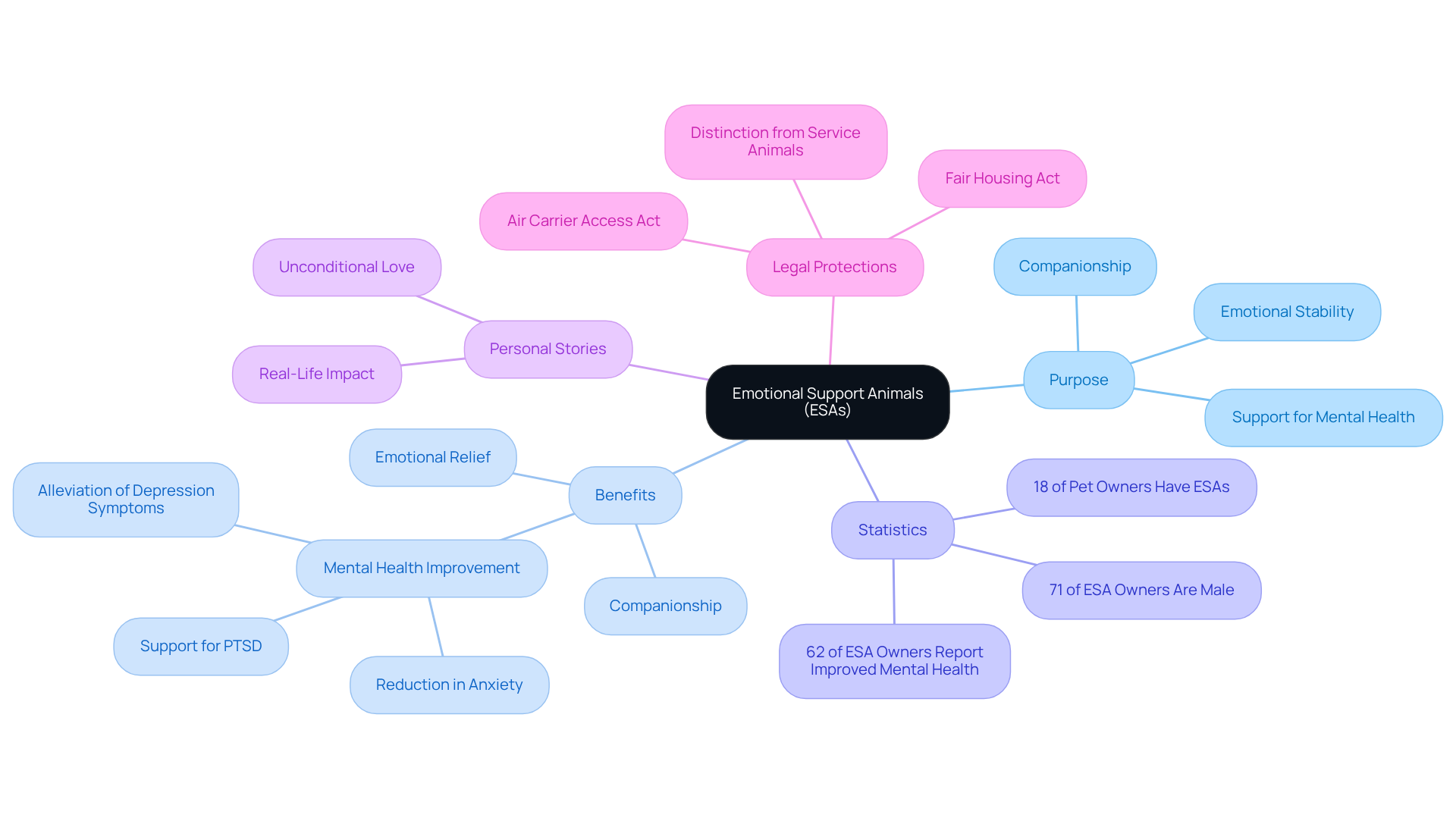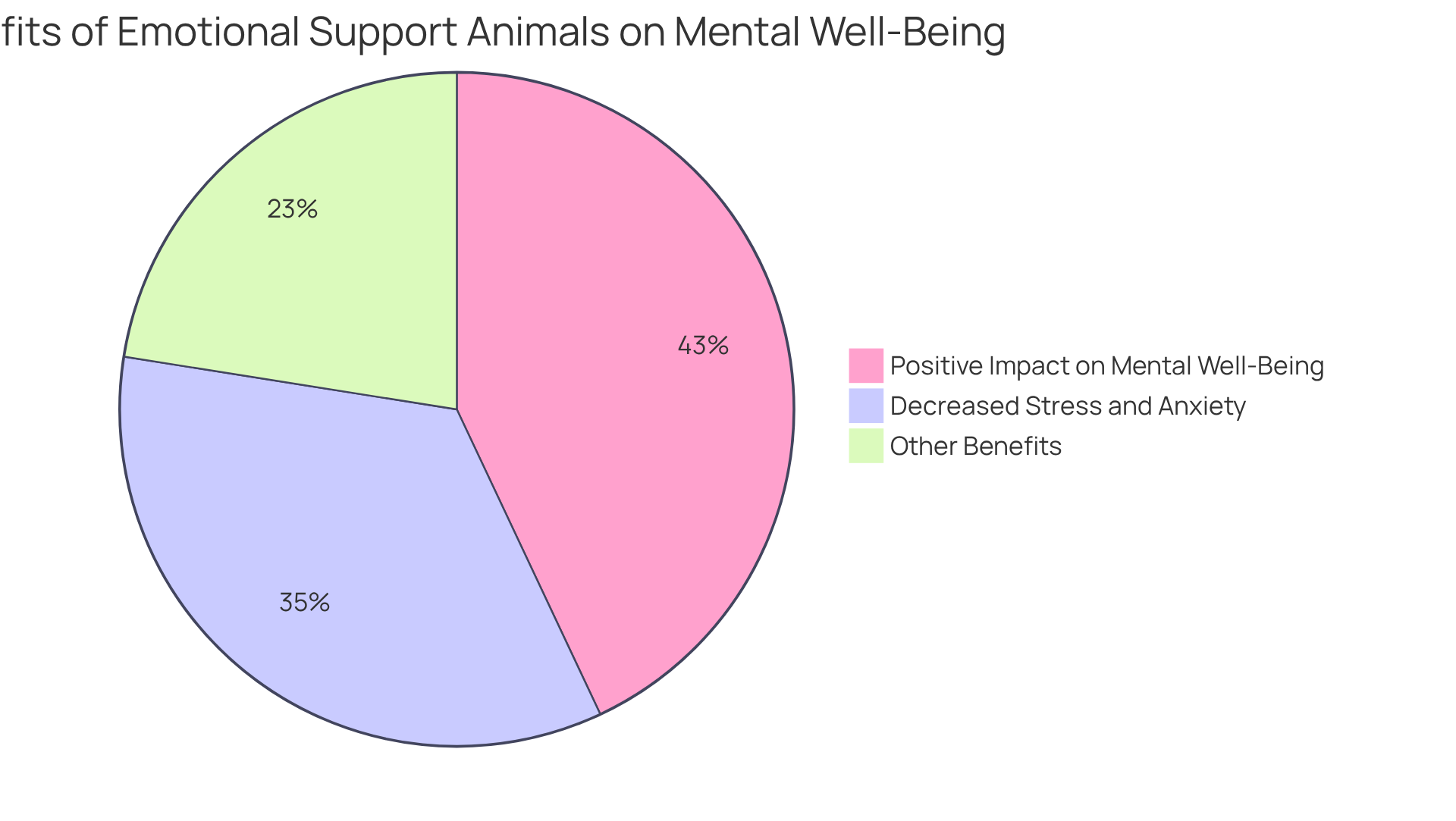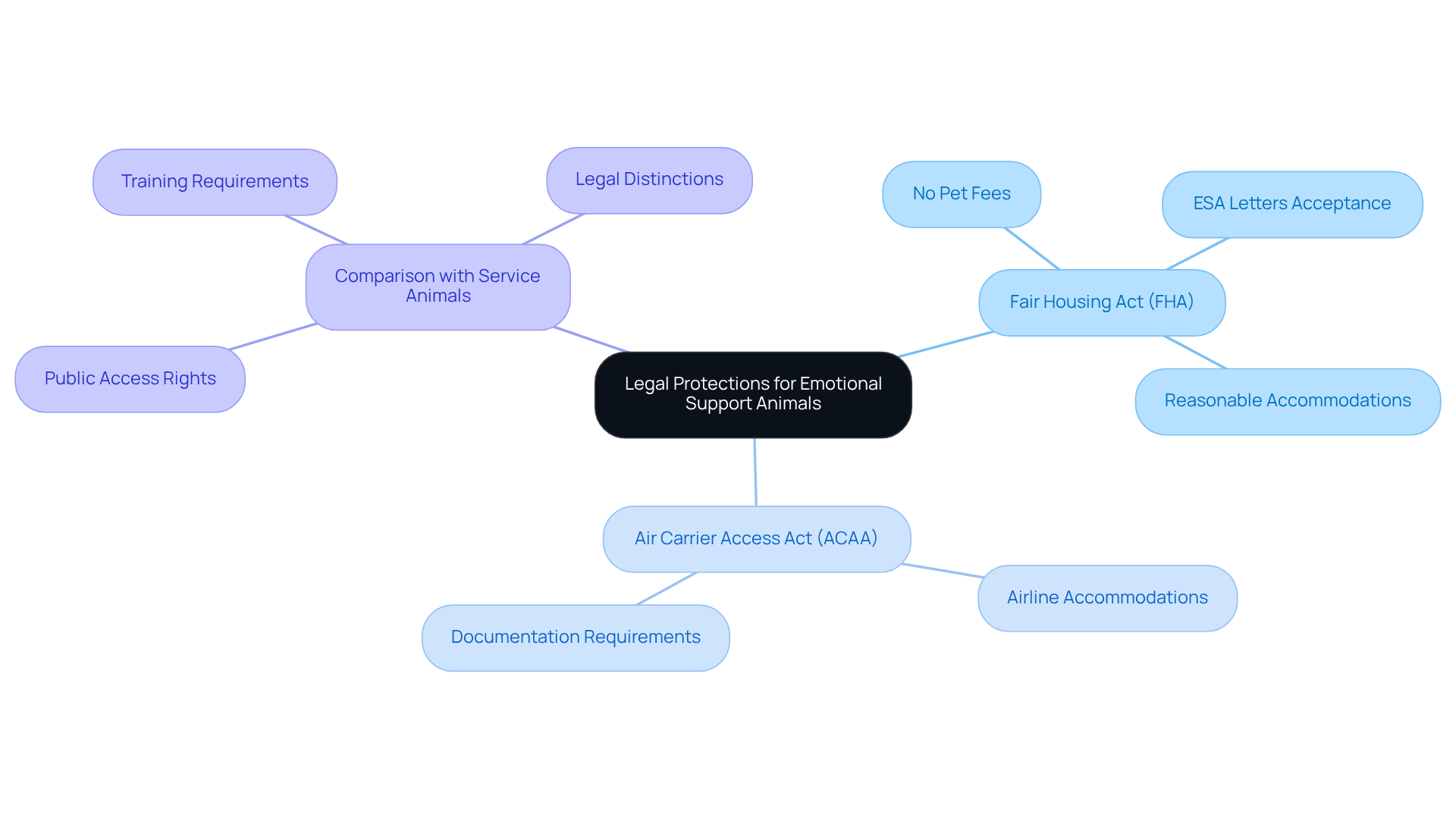

Understanding the Benefits of Emotional Support Animals
by Lena Park
Last updated: July 4, 2025
Verified and Approved by:
Angela Morris,
MSW, LCSW
Fact Checked

Overview
Emotional Support Animals (ESAs) offer invaluable companionship and emotional stability to individuals grappling with emotional or psychological challenges. These animals can significantly alleviate symptoms of conditions such as anxiety and depression. During the pandemic, a remarkable 62% of ESA owners reported improved mental health, illustrating the profound impact these animals can have on enhancing emotional well-being and quality of life. Personal accounts further underscore the transformative role ESAs play in providing comfort and support.
For many, the emotional challenges can feel overwhelming. Have you ever felt isolated in your struggles? The presence of an ESA can be a gentle reminder that you are not alone. These animals not only provide companionship but also foster a sense of security and stability, helping to ease the burdens of mental health issues.
As you consider the possibility of integrating an ESA into your life, remember that support is available through ESA letters, which can help formalize this important relationship. The journey towards emotional well-being is not one you have to navigate alone—there are compassionate solutions waiting to be discovered.
Introduction
Emotional Support Animals (ESAs) have become cherished companions for those facing emotional and psychological challenges, offering comfort and stability during difficult times. These beloved pets, often dogs or cats, play a crucial role in enhancing mental well-being, as more pet owners recognize the profound benefits they provide.
Yet, the path to obtaining an ESA and understanding the legal protections that accompany them can often feel overwhelming and confusing.
Have you ever wondered about the specific advantages of having an emotional support animal? How can you navigate the complexities of your rights and the process of acquiring one? Rest assured, there is support available to help guide you through this journey.
Define Emotional Support Animals: Purpose and Role
Emotional Support Animals (ESAs) are beloved pets that provide essential comfort and assistance to individuals facing emotional or psychological challenges. Unlike service animals, which are specifically trained to perform tasks for those with disabilities, ESAs primarily offer companionship and emotional stability. While any domesticated animal can serve as an ESA, dogs and cats are the most common choices. The presence of an ESA can significantly alleviate symptoms associated with conditions such as anxiety, depression, and PTSD, showcasing the benefits of emotional support animals as a crucial part of a person’s mental wellness treatment strategy.
Have you ever felt overwhelmed by your emotions? You are not alone. Statistics reveal that approximately 18% of pet owners in the U.S. have certified their animals as emotional support companions, highlighting the growing acknowledgment of the benefits of emotional support animals. Mental health experts emphasize the benefits of emotional support animals in enhancing emotional well-being. In fact, 62% of ESA owners reported improved mental health during the pandemic, compared to just 19% of those without an emotional support animal. This stark contrast highlights the importance of ESAs in providing emotional assistance and stability, especially during challenging times.
Real-life stories illustrate the profound impact of emotional support animals on people’s lives. Many ESA owners describe their pets as sources of unconditional love and companionship, helping to alleviate feelings of loneliness and anxiety. The bond between humans and their emotional support animals fosters a sense of purpose and routine, further contributing to improved mental health outcomes. How has your pet made a difference in your life?
It is also essential to recognize the legal protections available to ESA owners under the Fair Housing Act and Air Carrier Access Act, which assist individuals in navigating housing and travel challenges. Unlike service dogs, emotional support animals do not have the same legal rights to access public spaces, which is a significant distinction. Overall, the benefits of emotional support animals as invaluable companions include offering emotional relief and enhancing the quality of life for those in need. Remember, you are deserving of support and companionship on your journey to mental wellness.

Explore Mental Health Benefits of Emotional Support Animals
Research strongly supports the benefits of emotional support animals, revealing their profound impact on mental health. Many individuals face emotional challenges such as anxiety and depression, often feeling isolated in their struggles. Studies show that the presence of an ESA can lead to significant reductions in these feelings. For instance, engaging in simple activities like petting an animal can trigger a relaxation response, effectively lowering heart rates and fostering a sense of calm.
Imagine how comforting it can be to have a companion that not only reduces feelings of isolation but also enhances social interactions—both vital for emotional well-being. The unwavering affection and assistance provided by ESAs foster a sense of purpose and belonging, especially for those navigating mental health challenges. Furthermore, these animals can help individuals develop coping strategies, ultimately enhancing their emotional resilience.
Statistics reveal that 86% of pet owners feel their pets positively impact their mental well-being, with 69% noting decreased stress and anxiety as significant advantages. This highlights the crucial role that emotional support animals play in demonstrating the benefits of emotional support animals for improving mental well-being and overall quality of life. If you find yourself struggling, consider how an ESA could support you on your journey toward healing and connection. You are not alone, and there are compassionate solutions available to help you thrive.

Understand Legal Protections for Emotional Support Animals
The benefits of emotional support animals (ESAs) play a crucial role in the lives of individuals facing mental wellness challenges, and they are granted specific legal protections under the Fair Housing Act (FHA) and the Air Carrier Access Act (ACAA). For many, the struggle to find suitable housing can be overwhelming, especially when faced with restrictions on pets. The FHA allows individuals with mental health conditions to seek reasonable adjustments, which include the benefits of emotional support animals, enabling them to live even in pet-restricted housing. This legal framework means that landlords are obligated to accept valid ESA letters from licensed mental health professionals, which illustrates the benefits of emotional support animals by providing a sense of relief and security for tenants. In California, recent updates further reinforce these rights by ensuring that landlords cannot impose pet fees or deposits for emotional support animals, highlighting the benefits of emotional support animals for those with emotional support needs, so they are not burdened financially.
However, it’s important to understand that emotional support animals do not have the same public access rights as service animals. This distinction can be disheartening, as it limits the ability of ESAs to accompany their owners in public spaces. While service animals are recognized under the Americans with Disabilities Act (ADA) and can enter most public areas, emotional support animals primarily enjoy protections in housing and during air travel. The ACAA mandates that airlines accommodate emotional support animals, allowing them to travel with their owners, provided the necessary documentation is presented. This provision can make a significant difference for individuals who may otherwise feel isolated during travel.
Legal experts emphasize the importance of understanding these protections. One lawyer noted that the ACAA requires airlines to acknowledge the benefits of emotional support animals, which ensures that individuals with mental wellness challenges can travel with their support animals without excessive hardship. Successful accommodation requests often rely on the clarity and validity of the ESA documentation provided, underscoring the need for proper verification from licensed professionals. This process can be daunting, but knowing the rights and protections available can empower ESA owners.
Statistics indicate that a substantial number of ESA accommodation requests are accepted when supported by appropriate documentation, highlighting the benefits of emotional support animals and demonstrating the effectiveness of the FHA and ACAA in assisting those with mental wellness conditions. As you navigate these legal frameworks, remember that understanding your rights is vital. You are not alone in this journey; there is support available to help ensure that your emotional support animal is recognized and accommodated in both housing and travel contexts. By advocating for your rights, you can foster a nurturing environment that allows you and your ESA to thrive together.

Outline the Process for Obtaining an Emotional Support Animal
Obtaining an Emotional Support Animal (ESA) letter can be a crucial step for those navigating emotional and psychological challenges. Many individuals face struggles that can feel overwhelming. Consulting with a licensed mental health expert is the first step in this journey, as they will assess your unique needs to determine if an ESA is appropriate for you. This assessment is vital; trained professionals understand the profound therapeutic benefits of emotional support animals that they can provide. If the expert concludes that an ESA is necessary, they will issue a signed ESA letter, serving as official proof of your need for an emotional support animal.
At Wellness Wag, we recognize that the process can feel daunting. That’s why we offer a simplified online procedure for acquiring valid ESA letters through telehealth services, making it easier for you to access the support you deserve. Once you have your letter, you can choose a pet that truly aligns with your lifestyle and emotional needs. It’s important to remember that there is no official registry for emotional support animals; the letter from your licensed mental health professional is sufficient for legal purposes. After obtaining your ESA, keep this letter handy to present to landlords or airlines, ensuring you can advocate for your rights under the Fair Housing Act and Air Carrier Access Act.
It’s also essential to understand the distinction between Emotional Support Animals and Service Dogs. While both provide assistance, Service Dogs are specifically trained to perform tasks for individuals with disabilities, granting them different legal rights and access compared to ESAs. This streamlined process not only facilitates access to necessary support but also empowers you to navigate housing and travel challenges effectively. As Dr. Boris Levinson noted, the well-documented positive effects of animal therapy on mental health emphasize the benefits of emotional support animals, reinforcing the importance of obtaining an ESA letter for those in need. Remember, you are not alone on this journey; support is available, and taking this step can lead to a more fulfilling life.

Conclusion
Emotional Support Animals (ESAs) play a vital role in enhancing the emotional well-being of individuals facing various psychological challenges. These animals offer companionship and comfort, helping to alleviate symptoms of anxiety, depression, and PTSD. The bond between humans and their ESAs fosters a sense of stability and significantly contributes to mental health treatment strategies. It is essential to recognize and advocate for the rights of ESA owners, as this support is crucial in their journey toward healing.
Throughout this exploration, we have uncovered profound insights regarding the benefits of emotional support animals. Legal protections under the Fair Housing Act and Air Carrier Access Act, alongside the significant improvements in mental health reported by ESA owners, illustrate the compelling evidence of their impact. Many individuals experience reduced feelings of isolation and enhanced social interactions thanks to their ESAs. Additionally, obtaining an ESA letter can be streamlined through telehealth services, making this vital support accessible to those in need.
Ultimately, the significance of emotional support animals extends beyond mere companionship; they are a crucial component of mental health support systems. As awareness grows around the benefits of ESAs, advocating for their rights becomes increasingly important, ensuring individuals can access the support they deserve. For those grappling with emotional challenges, considering an ESA could be a transformative step toward healing and connection. Embracing the companionship of an emotional support animal may not only enhance personal well-being but also foster a deeper understanding of the importance of mental health support in our society.
Frequently Asked Questions
What are Emotional Support Animals (ESAs)?
Emotional Support Animals (ESAs) are pets that provide comfort and assistance to individuals facing emotional or psychological challenges. They primarily offer companionship and emotional stability rather than performing specific tasks like service animals.
What types of animals can be ESAs?
While any domesticated animal can serve as an ESA, dogs and cats are the most common choices.
How do ESAs help individuals with mental health issues?
The presence of an ESA can significantly alleviate symptoms associated with conditions such as anxiety, depression, and PTSD, making them a crucial part of a person’s mental wellness treatment strategy.
What statistics highlight the benefits of ESAs?
Approximately 18% of pet owners in the U.S. have certified their animals as emotional support companions. During the pandemic, 62% of ESA owners reported improved mental health, compared to just 19% of those without an ESA.
What real-life impacts do ESAs have on their owners?
Many ESA owners describe their pets as sources of unconditional love and companionship, helping to alleviate feelings of loneliness and anxiety. The bond fosters a sense of purpose and routine, contributing to improved mental health outcomes.
What legal protections do ESA owners have?
ESA owners have legal protections under the Fair Housing Act and the Air Carrier Access Act, which help them navigate housing and travel challenges. However, unlike service dogs, ESAs do not have the same legal rights to access public spaces.
What is the overall benefit of having an ESA?
The benefits of emotional support animals include providing emotional relief and enhancing the quality of life for those in need, serving as invaluable companions on the journey to mental wellness.
Certify Your Emotional Support Animal Today

Why You Can Rely on Us?
At Wellness Wag, we believe your pet deserves care rooted in both science and compassion. Each article is carefully researched, written in clear language for pet owners, and then reviewed by qualified professionals to ensure the information is evidence-based, current, and practical for real-life care. Our goal is to help you feel confident in making informed decisions about your pet’s health and well-being.
Reviewed by
Angela Morris, MSW, LCSW
Angela is a licensed clinical social worker with 20 years of experience in patient advocacy and community mental health. She has assisted numerous clients with ESA evaluations and brings a deep understanding of disability accommodations, ensuring that all information is accurate, supportive, and practical.

Written by :
Lena Park
Last Updated :
July 4, 2025












